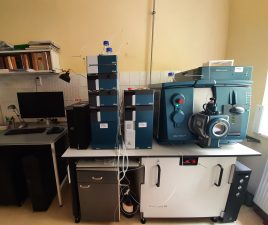 Web Content Display
Web Content Display
 Web Content Display
Web Content Display
 Web Content Display
Web Content Display
 Web Content Display
Web Content Display
 Web Content Display
Web Content Display
Development and equipping of apparatus facilities in the Department of Molecular Biology and Clinical Genetics
Lipidomic analyses, often also referred to as lipidomics, along with proteomics, genomics and transcriptomics, are classified as systems biology. Apart from the already mentioned other branches of systems biology, lipidomics is currently one of the most dynamically developing fields of science. Lipidomics focuses on the quantitative and qualitative assessment of cellular lipids in biological systems. Thanks to the application of modern research techniques such as fluorescence spectroscopy, nuclear magnetic resonance spectroscopy and mass spectrometry, it is possible to identify and quantify thousands of cellular molecular lipid types and their interactions with other lipids, proteins and other metabolites. Research work carried out in the Department of Molecular Biology and Clinical Genetics of the 2nd Department of Internal Medicine of the Professor Andrzej Szczeklik Collegium Medicum of the Jagiellonian University focuses mainly on the application of liquid chromatography-tandem mass spectrometry (LC-MS/MS) technique in lipidomic research, evaluating the concentration of over 50 lipid compounds and their metabolites. As part of research work carried out in the Department of Molecular Biology and Clinical Genetics, studies are conducted to assess the contribution of lipid compounds to the pathophysiology of such diseases as asthma, chronic obstructive pulmonary disease or autoimmune vasculitis, as well as cardiovascular diseases. In addition, work is being carried out to develop novel methods for the determination of new lipid compounds and to assess the usefulness of lipidomic determinations as potential biomarkers of disease processes.

The funds obtained in the framework of the qLIFE Priority Research Area of the Strategic Programme Excellence Initiative at Jagiellonian University enabled the development of the existing LCMS SCIEX QTRAP 4000 kit with elements of equipment enabling the system to work in a wide range of flows and the retrofitting of the HPLC kit with a valve system for the automatic switching of columns (installation in the existing thermostat). They also enabled the purchase of a UHPLC system and a Sciex Triple Quad 5500 Plus Qtrap Ready tandem mass spectrometer with the attachment for SELEX ION mobility spectrometry (it enables additional separation of ions in an electric field).
The extension of the existing research station and purchase of new equipment contributes to a significant acceleration of analytical work, which the Andrzej Szczeklik Department of Molecular Biology and Clinical Genetics of the 2nd Department of Internal Medicine of Jagiellonian University Medical College performs not only for the needs of its own projects, but also in cooperation with faculty and non-faculty units.
Development and equipping of apparatus facilities was made with funding from the qLIFE Priority Research Area within the framework of the Strategic Programme “Excellence Initiative” at Jagiellonian University.
Article on the qLIFE PRA website

